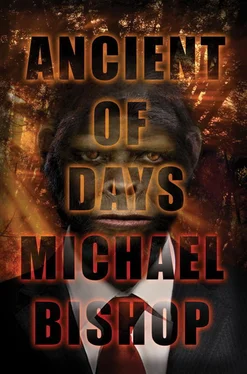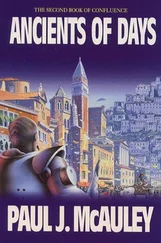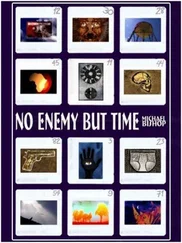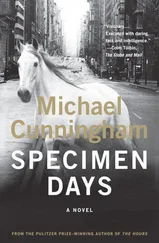We didn’t want to go to Athens, and Adam wasn’t quite ready to meet Blair face to face. So we gave the Zarakali student a letter outlining the conditions under which we might later grant Blair an interview, and, as soon as she’d left, we made our own plans to leave. We didn’t actually pull up stakes until December, though, and by January we were in Mexico City. There, feeling guilty about denying Blair’s interview request, Adam wrote the Great Man in care of the Interior Ministry of Zarakal, clarifying the conditions set forth in the first letter and specifying a June meeting here on Montaraz. Blair responded quickly. A June meeting in the Caribbean suited his schedule and travel itinerary almost perfectly. So, at long last, it will happen, and Adam will finally show the old bastard he’s not wearing a latex mask.
Let us know if you’ll be able to come. We’ll help you financially as far as we can, but both Adam and I believe you can make some money from this trip. Just exercise your professional skills and try to get some funding in addition to the Popular Anthropology travel money. It’s tacky to poor-mouth, but Adam and I are not wealthy. I’ve made next to nothing since forsaking the porcelain-plate business (a decision I don’t regret), and, as you may imagine, we’ve spent a small fortune pretending to be jet-setters and establishing residences here and there in the course of our travels. At last, though, we’re home. H.O.M.E.
Much love,
RuthClaire
P.S. Three days ago, I saw Brian Nollinger at the open-air market in Rutherford’s Port. You thought he was somewhere in the Dominican Republic, didn’t you, Caroline? But he’s not. Austin-Antilles has apparently relieved him of his duties as a canecutter demographer there. Adam says it’s possible he made suggestions for improving the workers’ lot that struck company officials as dangerous boat-rocking. On the other hand, maybe he’s simply doing the same kind of work for them on their Montaraz coffee plantations. Forgive me, Caroline, but I can’t help seeing his presence here as highly suspicious. Oh, yes—he didn’t see me when I saw him , and I was careful not to let him see me. I finished doing my marketing and drove home as quickly as I could.
P.P.S. Please do us these favors. Adam and I have really missed our friends from stateside. We really have.
Caroline and I decided to go. Our honeymoon over the Christmas break had consisted of five days in Savannah and two on Tybee Island, a week of blustery weather during which we had dreamed of the voluptuous dazzle of summer. Our trip to Montaraz, then, would be an improvement upon our December honeymoon. We would combine business with pleasure. Caroline hadn’t committed to teaching a summer class, and I could set my own hours. That we could deduct almost everything we spent as business expenses had escaped neither of us—the Montarazes had arranged matters to make that possible.
The P.S. to RuthClaire’s letter disturbed me. Last summer, Brian had gone to the Dominican Republic for Austin-Antilles Corporation; now he had shown up on Montaraz at a great time for someone who had once told the world that Adam was a habiline. Had Brian gotten a tip through the paleoanthropological grapevine that A. P. Blair was traveling to Rutherford’s Port for some undisclosed, but promising, reason? I looked at Caroline, remembering her former interest in the man, and my heart misgave me. In my most self-critical moments, I told myself that I had caught her on the rebound.
“When’s the last time you heard from your old flame?”
Caroline’s eyes cut across me like lasers. “In January. He sent a card wishing us happiness and long life. I’d told him we were getting married, and he sent that card.”
“Why tell him anything? Why rub it in?”
“Brian meant something to me once,” she said. “I still consider him a friend. I like to stay in touch with my friends.”
“Yeah.”
“You’ve seen every note Brian’s written me since he left Atlanta. There’ve been four, all but the last one mailed before we married. What’s the matter with you?”
“He’s in Montaraz, Caroline, and I don’t want to see him.”
“Well, I had nothing to do with his showing up there, and I won’t pussyfoot around everyplace we go on that damn island trying to avoid him. If I see him, I’ll speak to him. He may not even be there when we arrive. He may have taken a holiday from his work in the Dominican. He may have been trying to satisfy his natural curiosity about Montaraz. Okay?”
“Okay.”
“Get off my case, Paul. I’m not Brian’s pen-pal paramour.”
The conversation ended. I’d almost provoked a serious quarrel, but Caroline had not let me. She’d held her anger in check. As a penance for my boorishness, I took her to dinner at Bugatti’s, and we spent nearly the entire meal making our travel plans.
In mid-May, I drove to Paradise Farm to disinter T. P.’s ashes. The Hothlepoya County Sanitarian, Jim Stevens, approved my request, and a new owner of my former property escorted me to the burial plot, which, in fulfillment of a clause authorizing the sale, his cooperative had enclosed with a treated-redwood fence and a hedge of flowering shrubs. I did the digging myself, and it took only twenty minutes to unearth the miniature casket holding the urn. I removed the urn without pulling the casket clear of the grave and then refilled the hole with displaced soil and sod. A small pink-marble headstone with a brass plaque remained to mark the site. I let the plaque stay, a memorial as much to Adam’s idealism as to the sadly brief life of my murdered godson.
* * *
In June, Caroline and I flew to Miami.
The next day we set sail aboard the Cavalcade Caribbean cruiseship ’Zepaules for Cap-Haïtien. Our voyage was easy and uneventful. We docked in Cap-Haïtien on a mild summer evening, spent the night in a plush hotel, and took a tour boat to Rutherford’s Port with a small group of French-speaking Europeans who held themselves aloof from Caroline and me.
On the boat, the only person who took any notice of us, and who smiled at us each time he caught our attention, was a dark-skinned member of Duvalier’s Volontaires de la Sécurité Nationale . This militia is better known both locally and abroad as the “Tontons Macoutes,” a folkloric appellation implying that its “volunteers” are evil uncles who sometimes bag up unoffending citizens and, without charge or trial, spirit them away to nowhere, never to be heard of again. Our smiling Tonton Macoute wore the rural uniform of the species, namely faded blue jeans, a faded denim vest, scuffed military boots, a crushed black beret, and a pair of huge mirror-lens sunglasses. These monstrous lenses led me to suspect that the man was spying on us even when he appeared to be half-facing away. On a shoulder sling, he carried an ancient Springfield rifle whose barrel he had lovingly oiled and whose stock he’d either waxed or lacquered. A bulge under his denim vest told of another weapon, a revolver, in an armpit holster. He made me nervous, this smiler. And, to my dismay, he sauntered across the deck to the rail at which Caroline and I were standing. Rather like a Muslim, he touched his forehead in greeting.
“Americans, yes?”
We admitted to the charge.
“On what business do you come?”
I looked at Caroline. How much to tell this bogeyman? Was he making small talk, or were his questions subtle commands for self-disclosure? His teeth, when he smiled, looked like nicotine-stained cuff links—that big, that yellow.
Caroline played coy. “How do you know we haven’t come for pleasure?”
“Rutherford’s Port is, uh, ennuyeux . Dull, I think you say. Real pleasure-seekers go to Port-au-Prince. Habitation Leclerc, maybe. Those gentlemen—” he nodded at three of the French-speaking travelers—“are coffee buyers from the mother country; not playboys, not drug dealers. They come to Montaraz to work. You, too, I bet.”
Читать дальше












